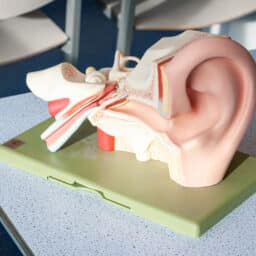Understanding the Benefits of Treating Hearing Loss as a Senior

As we age, hearing loss becomes a frequent topic of discussion, with nearly half of adults over 75 having difficulty hearing. Beyond the physical challenges, untreated hearing loss can exact a toll on one’s emotional well-being, fostering feelings of disconnection and frustration. It’s a silent struggle that often goes unaddressed for years, with sufferers living…
Give Your Hearing Health a Spring Refresh

As the vibrant colors of spring begin to blossom and the sun warms the earth, it’s not just our homes that could use a bit of refreshing. It’s also an ideal time to take stock of our healthcare routines, including our audiology practices. Whether you wear hearing aids or simply want to ensure your hearing…
Understanding Nonmalignant Temporal Bone Tumors and Hearing Health

Hearing the word “tumor” from a doctor can be pretty scary, and it’s normal to feel stressed at the mention of it. But taking a little time to learn about nonmalignant temporal bone tumors and how they’re treated can help calm your worries. The Temporal Bone Explained Located at the skull’s base, the temporal bone…
Muffled Hearing After Noise Exposure: What To Know

After spending a noisy evening out at The Old Post, enjoying a lively concert or a booming movie, it’s not uncommon to find oneself grappling with somewhat dulled hearing and a persistent ringing in the ears. This experience, known as a temporary threshold shift, signifies a short-term alteration in our hearing threshold, a condition that…
What Hearing Protection Is Available and How Do You Use It?

It is estimated that approximately 18% of adults aged 20–69 have speech frequency hearing loss due to prolonged exposure to loud noises at work. And once your hearing is damaged, you can’t get it back. Hence, it’s important to know and understand what hearing protection may be available to you and use it appropriately to…
What Is the Impact of Concussions on Sound Processing?

A concussion is a type of traumatic brain injury that affects your brain function. In 2020, approximately 6.8% of children aged 17 and younger experienced symptoms from a concussion or other traumatic brain injury. While many people have experienced a bump or jolt to the head from an errant soccer ball at Caras Park or…
Can Eating Healthy Reduce Your Hearing Loss Risk?

A recent study has shown how well you eat can impact slowing age-related hearing loss. The study by Brigham and Women’s Hospital concluded that women with healthier diets had less hearing loss than those with a less healthy diet. Stock up on fresh produce at Missoula Farmer’s Market to promote your long-term hearing health. Impact of a…
How Untreated Hearing Loss Can Affect Your Hobbies

It’s important to have things in life that bring you joy. For many, our hobbies are just that. Whether you like to garden, paint, play tennis or go for hikes at the North Loop Trail, hobbies keep your mind active and engaged and help you stay connected to others. Unfortunately, untreated hearing loss can make…
How Treating Hearing Loss Will Help Your Career

Hearing loss is a common condition that affects millions of people. Left untreated, it can impact every aspect of your life, including your career. The good news? The right hearing loss treatment, like hearing aids, can actually help you in your career. How Hearing Aids Can Benefit You at Work Scheduling a Hearing Test If…
Here’s How Untreated Hearing Loss May Affect Your Memory

Hearing loss affects so many different parts of your life. It makes it harder to understand speech and focus on what others are saying, whether at the office or grabbing a latte with friends at Clyde Coffee. Research has also indicated that, if left untreated, hearing loss has the potential to affect your memory. What…